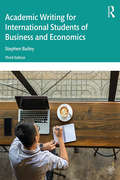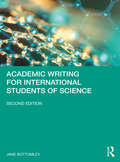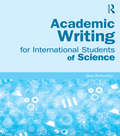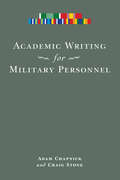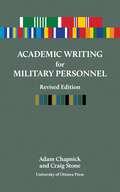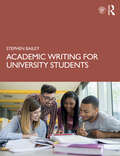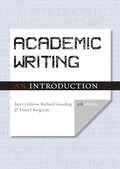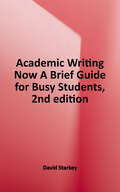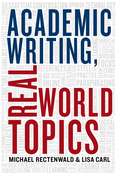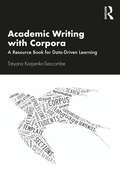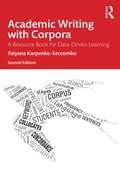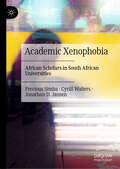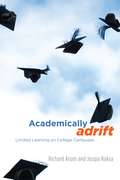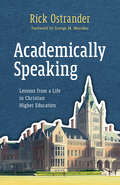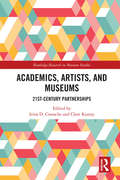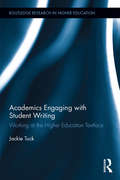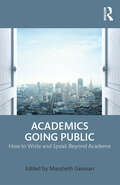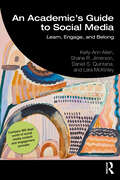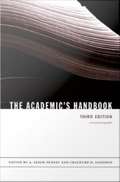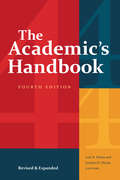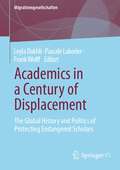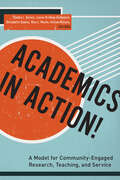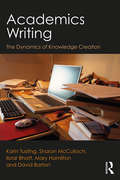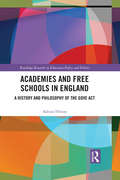- Table View
- List View
Academic Writing for International Students of Business and Economics
by Stephen BaileyThe third edition of Academic Writing for International Students of Business and Economics is written to help international students succeed in writing essays, reports and other papers for their English-language academic courses. Thoroughly revised and updated to reflect issues such as diversity and sustainability, this book is designed to let students and teachers easily find the help they need, both in the classroom and for self-study. The book is divided into five parts, comprising a total of 42 units: The Writing Process Elements of Writing Language Issues Vocabulary for Writing Writing Models New topics in this edition include Writing in Groups, Written British and American English and Reflective Writing. In addition, the new interactive website has a full set of teaching notes as well as more challenging exercises, revision material and links to other sources. Additional features of the book include: Models provided for writing tasks such as case studies and literature reviews Use of authentic academic texts from a range of sources Designed for self-study as well as classroom use Useful at both undergraduate and postgraduate level A complete set of answers to the practice exercises Cross-references across all units Providing a glossary to explain technical terms and written to deal with the specific language issues faced by international students of Business and Economics, this practical, user-friendly book is an invaluable guide to academic writing in English.
Academic Writing for International Students of Business and Economics
by Stephen BaileyThe third edition of Academic Writing for International Students of Business and Economics is written to help international students succeed in writing essays, reports and other papers for their English-language academic courses. Thoroughly revised and updated to reflect issues such as diversity and sustainability, this book is designed to let students and teachers easily find the help they need, both in the classroom and for self-study.The book is divided into five parts, comprising a total of 42 units: The Writing Process Elements of Writing Language Issues Vocabulary for Writing Writing Models New topics in this edition include Writing in Groups, Written British and American English and Reflective Writing. In addition, the new interactive website has a full set of teaching notes as well as more challenging exercises, revision material and links to other sources. Additional features of the book include: Models provided for writing tasks such as case studies and literature reviews Use of authentic academic texts from a range of sources Designed for self-study as well as classroom use Useful at both undergraduate and postgraduate level A complete set of answers to the practice exercises Cross-references across all units Providing a glossary to explain technical terms and written to deal with the specific language issues faced by international students of Business and Economics, this practical, user-friendly book is an invaluable guide to academic writing in English.
Academic Writing for International Students of Science
by Jane BottomleyThis revised and updated second edition is an accessible companion designed to help science and technology students develop the knowledge, skills and strategies needed to produce clear and coherent academic writing in their university assignments. Using authentic texts to explore the nature of scientific writing, the book covers key areas such as scientific style, effective sentence and paragraph structure, and coherence in texts and arguments. Throughout the book, a range of tasks offers the opportunity to put theory into practice. The explorative tasks allow you to see how language works in a real scientific context, practice and review tasks consolidate learning and help you to develop your own writing skills, and reflective tasks encourage you to think about your own knowledge and experience, and bring this to bear on your own writing journey at university. Key features of the new edition include: • Updated content and additional tasks throughout • New chapters, covering writing in the sciences and writing at university • The introduction of reflective tasks • Up-to-date examples of authentic scientific writing Clear, engaging and easy-to-use, this is an invaluable tool for the busy science or technology student looking to improve their writing and reach their full academic potential.
Academic Writing for International Students of Science
by Jane BottomleyAcademic Writing for International Students of Science will help international students to develop their command of academic scientific writing in English. It guides students through the writing process itself, and will help them to produce clear, well-written and well-organised essays and reports. The book covers a range of issues such as how to explain complex ideas clearly and concisely, how to develop a coherent argument, and how to avoid plagiarism by making effective reference to sources. Through detailed analysis of authentic scientific texts, the book will enhance students’ understanding of the nature of academic scientific writing. This will enable them to understand how language and discourse function in a real scientific context. The texts serve as models of good writing and are followed by practice activities which will help students to develop their own writing skills. Key topics include: the writing process; academic scientific style; sentence structure; paragraph development; referring to sources; coherence, argument and critical thinking; academic and scientific conventions. This book will be an invaluable companion to those studying for a science or technology degree in an English-speaking institution. Informative study boxes, model answers and a clear, comprehensive answer key mean that the book can be used for self-study or with guidance in the classroom.
Academic Writing for Military Personnel
by Adam Chapnick Craig StoneAcademic Writing for Military Personnel is written for members of the military who are either new to or re-entering the academic community and who need to familiarize themselves with academic writing. The authors, an experienced writing instructor and a retired military officer, show how persuasive academic writing enhances officers’ effectiveness in their regular duties, especially as they reach more senior levels of service. They explain the differences between staff writing and academic writing, and outline some of the common errors military personnel make when transitioning from one to the other. The book’s chapters outline the value of strong written communication skills, the research process, the writing process, academic referencing, and frequent grammatical and syntactical errors. Specific examples chosen with a military audience in mind are integrated throughout the book to provide the reader with relevant and practical guidance. The book concludes with a discussion on how officers can use the knowledge they have acquired through their professional experiences in their academic work. As the only comprehensive guide to effective academic writing designed specifically for military personnel, this book will be a crucial addition to the libraries of junior and senior officers in militaries worldwide.
Academic Writing for Military Personnel, revised edition: Revised Edition (Standalone titles)
by Adam Chapnick Craig StoneAcademic Writing: A Guide for Military Personnel est un manuel de rédaction conçu pour aider le personnel militaire à rédiger des travaux savants dans un style clair et efficace. Fruit de la collaboration entre un professeur d’écriture chevronné et un officier militaire à la retraite, le manuel s’adresse aux membres des forces armées qui rejoignent le monde universitaire et qui ont déjà rédigé dans un contexte professionnel militaire ou qui n’ont aucune expérience de la rédaction. En plus d’enseigner aux officiers comment rédiger efficacement, cet ouvrage explique en quoi la maîtrise des techniques de rédaction est utile au personnel des forces armées dans leurs tâches régulières, en particulier aux échelons supérieurs. L’ouvrage traite de l’importance de savoir communiquer par écrit, de ce qui distingue la rédaction savante de la rédaction professionnelle, des processus de recherche et de rédaction proprement dite, du professionnalisme dans la sphère universitaire ainsi que des problèmes et défis fréquemment rencontrés par les rédactrices et les rédacteurs. Un dernier chapitre novateur traite de la manière dont les officiers peuvent mettre à profit les connaissances qu’ils ont acquises par leurs expériences professionnelles dans le contexte universitaire. Des exemples concrets — à l’usage particulier des militaires — sont présentés tout au long du texte pour guider la lectrice et le lecteur de manière pratique et pertinente.Cette édition révisée comprend de nouveaux exemples provenant d’une plus grande variété d’auteurs. Elle prend en compte l’évolution récente des technologies de communication et reflète les nouvelles avancées dans les domaines de l’enseignement et de l’apprentissage.Cet ouvrage, qui est le seul guide exhaustif sur la rédaction à l’usage du personnel militaire, est un ajout incontournable à la bibliothèque de tout officier militaire où qu’il se trouve et quel que soit son rang.Ce livre est publié en anglais. Note : Une version française de ce livre sera disponible en 2023.Formats disponibles : couverture souple, PDF accessible et ePub accessible
Academic Writing for University Students
by Stephen BaileyAcademic Writing for University Students is designed to help all students succeed in writing essays, reports and other papers for coursework and exams effectively. Academic writing is often the biggest challenge facing college and university students, but this book provides all the tools needed to master the necessary skills. The book is divided into four parts, to help teachers and students easily find the help they need, both in the classroom and for self-study: The Writing Process: From finding suitable sources, through to editing and proofreading Writing Types: Practice with common assignments such as reports and cause-effect essays Writing Tools: Skills such as making comparisons, definitions, punctuation and style Lexis: Academic vocabulary, using synonyms, nouns, adjectives, verbs and adverbs This key handbook breaks down and practises every stage of essay writing. All units are fully cross-referenced, and a complete set of answers to the practice exercises is included. In addition, the companion website hosts comprehensive teaching notes as well as more challenging exercises, revision material and links to other sources. Designed for self-study as well as classroom use, this book uses authentic academic texts from a range of sources and provides models for common writing tasks such as case studies, while progress checks are included for each part to enable students to assess their learning. Academic Writing for University Students is an invaluable guide to all aspects of academic writing in English.
Academic Writing: An Introduction - Fourth Edition
by Janet Giltrow Richard Gooding Daniel BurgoyneAcademic Writing has been widely acclaimed in all its editions as a superb textbook―and an important contribution to the pedagogy of introducing students to the conventions of academic writing. The book seeks to introduce student readers to the lively community of research and writing beyond the classroom, with its complex interactions, values, and goals. It presents writing from a range of disciplines in the humanities, social sciences, and natural sciences, cultivating students’ awareness of the subtle differences in genre.
Academic Writing Now: A Brief Guide for Busy Students
by David StarkeyThis Guide is a rhetoric designed to cover the basics of a college writing course in a concise, student-friendly format. Anything inessential to the business of college writing has been excluded. Each chapter concentrates on a crucial element of composing an academic essay and is capable of being read in a single sitting. The book is loaded with "timesaver tips," ideas for making the most of the student's time, along with occasional warnings to avoid common errors made by student writers. Each short chapter concludes with questions and suggestions designed to trigger class discussion. <p><p>The second edition has been updated throughout, with special attention to making the book even better suited to accelerated and co-requisite composition courses.
Academic Writing, Real World Topics
by Michael Rectenwald Lisa CarlAcademic Writing, Real World Topics fills a void in the writing-across-the-curriculum textbook market. It draws together articles and essays of actual academic prose as opposed to journalism; it arranges material topically as opposed to by discipline or academic division; and it approaches topics from multiple disciplinary and critical perspectives. With extensive introductions, rhetorical instruction, and suggested additional resources accompanying each chapter, Academic Writing, Real World Topics introduces students to the kinds of research and writing that they will be expected to undertake throughout their college careers and beyond. Readings are drawn from various disciplines across the major divisions of the university and focus on issues of real import to students today, including such topics as living in a digital culture, learning from games, learning in a digital age, living in a global culture, our post-human future, surviving economic crisis, and assessing armed global conflict. The book provides students with an introduction to the diversity, complexity and connectedness of writing in higher education today. Part I, a short Guide to Academic Writing, teaches rhetorical strategies and approaches to academic writing within and across the major divisions of the academy. For each writing strategy or essay element treated in the Guide, the authors provide examples from the reader, or from one of many resources included in each chapter's Suggested Additional Resources. Part II, Real World Topics, also refers extensively to the Guide. Thus, the Guide shows student writers how to employ scholarly writing practices as demonstrated by the readings, while the readings invite students to engage with scholarly content.
Academic Writing with Corpora: A Resource Book for Data-Driven Learning
by Tatyana Karpenko-SeccombeAcademic Writing with Corpora offers a step-by-step accessible guide to using concordancers and aims to help introduce data-driven learning into the academic English classroom. Addressing the challenges faced by EAP teachers when explaining to their students how to write 'naturally', this book provides a solution to the problem by placing an emphasis on learning from expert and proficient writing. In doing so, it: takes a highly practical approach; uses Lextutor, an easy-to-use, open access concordancer, whilst introducing students to tools, such as SkELL, MICUSP and BNC-English Corpora; fosters autonomous learning by demonstrating how to solve everyday difficulties in word choice and grammar; helps teachers to use corpora in teaching proficient writing and helps students to improve their academic writing by learning from the best examples in their field; guides students towards better awareness of the communicative side of academic writing. This book forms essential reading for all students on academic writing and EAP courses or who wish to improve their writing.
Academic Writing with Corpora: A Resource Book for Data-Driven Learning
by Tatyana Karpenko-SeccombeAcademic Writing with Corpora offers an accessible guide to using corpora in academic writing successfully and productively. Addressing the challenges faced by teachers of English for academic purposes when explaining to their students how to write 'naturally', this book places an emphasis on learning from expert and proficient writing.Revised and updated throughout, this book:• takes a highly practical approach, now with new tasks and the latest software features;• fosters autonomous learning by demonstrating how to solve everyday difficulties in word choice and grammar;• places a special emphasis on the use of corpora to explore rhetorical strategies;• introduces the reader to five corpus tools (SkELL, Lextutor, COCA, MICUSP and AntConc);• offers a new section on DIY corpora, including basic principles and a step-by-step guide to building a corpus, with an introduction to AntConc;• now includes a ‘Further reading’ section for each chapter.This resource book is for teachers looking to introduce data-driven learning into the classroom without spending excessive time on researching corpora and preparing tasks. It is also for second-language academic writers – university students and researchers – who are motivated to improve their writing and to learn from proficient and expert writing in their area.
Academic Xenophobia: African Scholars in South African Universities
by Precious Simba Cyrill Walters Jonathan D. JansenThis book explores the layered experiences of Black African faculty members at the 26 public universities in South Africa. Through rich narrative case studies and detailed policy analysis, the authors examine the manifestations of xenophobia within the academic context, including its impact on individuals, institutions, and policies. The book will be valuable to scholars, policymakers, and practitioners interested in understanding the evolving landscape of xenophobia, tertiary education, and immigration in South Africa.
Academically Adrift: Limited Learning on College Campuses
by Richard Arum Josipa RoksaIn spite of soaring tuition costs, more and more students go to college every year. A bachelor's degree is now required for entry into a growing number of professions. And some parents begin planning for the expense of sending their kids to college when they're born. Almost everyone strives to go, but almost no one asks the fundamental question posed by Academically Adrift: are undergraduates really learning anything once they get there? For a large proportion of students, Richard Arum and Josipa Roksa's answer to that question is a definitive no. Their extensive research draws on survey responses, transcript data, and, for the first time, the state-of-the-art Collegiate Learning Assessment, a standardized test administered to students in their first semester and then again at the end of their second year. According to their analysis of more than 2,300 undergraduates at twenty-four institutions, 45 percent of these students demonstrate no significant improvement in a range of skills--including critical thinking, complex reasoning, and writing--during their first two years of college. As troubling as their findings are, Arum and Roksa argue that for many faculty and administrators they will come as no surprise--instead, they are the expected result of a student body distracted by socializing or working and an institutional culture that puts undergraduate learning close to the bottom of the priority list. Academically Adrift holds sobering lessons for students, faculty, administrators, policy makers, and parents--all of whom are implicated in promoting or at least ignoring contemporary campus culture. Higher education faces crises on a number of fronts, but Arum and Roksa's report that colleges are failing at their most basic mission will demand the attention of us all.
Academically Speaking: Lessons from a Life in Christian Higher Education
by Rick OstranderA personal odyssey through the world of Christian higher education, narrated by a professional who has worked on both sides of the faculty-administrative divide. What is the world of Christian higher education really like? Rick Ostrander&’s thirty-year career in Christian academia equips him to provide an insider&’s perspective on the field and its future. Ostrander cut his teeth as an undergraduate at Moody Bible Institute and the University of Michigan before completing his PhD with George Marsden at Notre Dame. From there he worked as a professor and administrator at various Christian colleges, a vice president at the Council for Christian Colleges and Universities, and an independent academic consultant. Throughout, he witnessed the many dramatic transformations of Christian higher education. Ostrander traces an attempt to cultivate evangelical intellectualism in the &’90s to the political and economic forces that shake Christian colleges today. Through lively storytelling, Ostrander highlights the qualities and quirks of Christian higher education. His experiences offer readers insight into how Christian colleges can flourish in an age of uncertainty.
Academics, Artists, and Museums: 21st-Century Partnerships (Routledge Research in Museum Studies)
by Irina Costache Clare KunnyCollaboration and interdisciplinary practice in the museum are on the rise. Academics, Artists, and Museums examines twenty-first century partnerships between the museum and higher education sectors, with a focus on art museums and exhibits. The edited volume offers detailed analysis of how innovative curatorial relationships between museums and academia have sought to engage new, younger, audiences through the collaborative transformation of museums and exhibitions. Thematic topics explored include the forming and nature of interdisciplinary partnerships, the integration of museum learning into higher education, audience engagement, and digital technology. With a particular emphasis on practice in the US, the range of projects discussed includes those at both widely recognized and lesser known institutions, from The Met to the Tohono O’odham Nation Cultural Center in the US, to Ewha University Museum in South Korea, and Palazzo Strozzi in Italy. The role of art and the work of the artist are firmly positioned at the core of many of the relationships explored. Academics, Artists, and Museums advocates for the museum as an experimental ‘laboratory’ where academia, art and the museum profession can combine to engage new audiences. It is a useful resource for museum professionals, artists, scholars, and students interested in collaboration and innovative practice.
Academics Engaging with Student Writing: Working at the Higher Education Textface (Routledge Research in Higher Education)
by Jackie TuckStudent writing has long been viewed as a problem in higher education in the UK. Moreover, the sector has consistently performed poorly in the National Student Survey with regard to assessment and feedback. Academics Engaging with Student Writing tackles these major issues from a new and unique angle, exploring the real-life experiences of academic teachers from different institutions as they set, support, read, respond to and assess assignments undertaken by undergraduate students. Incorporating evidence from post-1992 universities, Oxbridge, members of the Russell Group and others, this book examines working practices around student writing within the context of an increasingly market-oriented mass higher education system. Presenting a wealth of relevant examples from disciplines as diverse as History and Sports Science, Tuck makes extensive use of interviews, observations, texts and audio recordings in order to explore the perspectives of academic teachers who work with student writers and their texts. This book will be of interest to researchers, academics and postgraduate students in the fields of academic literacies, higher education, language and literacy, language in higher education, English for academic purposes and assessment. Furthermore, academic teachers with experience of this crucial aspect of academic labour will welcome Tuck’s pioneering work as an indispensable tool for making sense of their own engagement with student writers.
Academics Going Public: How to Write and Speak Beyond Academe
by Marybeth GasmanAcademics Going Public makes the case for academics to enter the public sphere and simultaneously gives them the tools to do so. This important book helps faculty members who want to become more active on a national scale and would like to move beyond publication in scholarly journals and books. Expert contributors explore how to have a voice about salient higher education issues and engage traditional media, new medias, policymakers, funders, and the general public. Chapters offer best approaches and concrete strategies for diverse audiences, helping faculty have an impact on society by becoming more publicly engaged and writing for broader audiences in more inclusive ways. This critical guide also covers strategies for confronting obstacles academics might encounter along the way and presents tactics for responding to controversy and backlash.
An Academic's Guide to Social Media: Learn, Engage, and Belong
by Kelly-Ann Allen Shane R. Jimerson Daniel S. Quintana Lara McKinleyAre you an academic who struggles to know what to post on social media and how to disseminate your research effectively on different social media platforms? Social media serves as a powerful communication tool, yet while most academics are aware of the benefits of social media, many are unsure of what to post, and how to do it in a way that is authentic, engaging, and above all, comfortable! This user-friendly practical guide is designed for all academics who aim to engage in social media platforms in an effective and productive way. This book explains how academics can build their reputation, develop networks, and disseminate their research. It includes 365 useful post prompts applicable to all mainstream social media platforms which help guide academics on what to post on the platforms they choose to engage with. The book is designed for all academics at all levels and can be applied across various social media platforms including Facebook, Linkedin, Twitter, and Instagram.
The Academic's Handbook
by A. Leigh Deneef Craufurd D. GoodwinThis new, revised, and expanded edition of the popularAcademic’s Handbookis an essential guide for those planning or beginning an academic career. Faculty members, administrators, and professionals with experience at all levels of higher education offer candid, practical advice to help beginning academics understand matters including: The different kinds of institutions of higher learning and expectations of faculty at each. The advantages and disadvantages of teaching at four-year colleges instead of research universities. The ins and outs of the job market. Alternatives to tenure-track, research-oriented positions. Salary and benefits. The tenure system. Pedagogy in both large lecture courses and small, discussion-based seminars. The difficulties facing women and minorities within academia. Corporations, foundations, and the federal government as potential sources of research funds. The challenges of faculty mentoring. The impact of technology on contemporary teaching and learning. Different types of publishers and the publishing process at university presses. The modern research library. The structure of university governance. The role of departments within the university. With the inclusion of eight new chapters, this edition ofThe Academic’s Handbookis designed to ease the transition from graduate school to a well-rounded and rewarding career. Contributors. Judith K. Argon, Louis J. Budd, Ronald R. Butters, Norman L. Christensen, Joel Colton, Paul L. Conway, John G. Cross, Fred E. Crossland, Cathy N. Davidson, A. Leigh DeNeef, Beth A. Eastlick, Matthew W. Finkin, Jerry G. Gaff, Edie N. Goldenberg, Craufurd D. Goodwin, Stanley M. Hauerwas, Deborah L. Jakubs, L. Gregory Jones, Nellie Y. McKay, Patrick M. Murphy, Elizabeth Studley Nathans, A. Kenneth Pye, Zachary B. Robbins, Anne Firor Scott, Sudhir Shetty, Samuel Schuman, Philip Stewart, Boyd R. Strain, Emily Toth, P. Aarne Vesilind, Judith S. White, Henry M. Wilbur, Ken Wissoker
The Academic's Handbook, Fourth Edition: Revised and Expanded
by Lori A. Flores and Jocelyn H. OlcottIn recent years, the academy has undergone significant changes: a more competitive and volatile job market has led to widespread precarity, teaching and service loads have become more burdensome, and higher education is becoming increasingly corporatized. In this revised and expanded edition of The Academic's Handbook, more than fifty contributors from a wide range of disciplines and backgrounds offer practical advice for academics at every career stage, whether they are first entering the job market or negotiating the post-tenure challenges of leadership and administrative roles. Contributors affirm what is exciting and fulfilling about academic work while advising readers about how to set and protect boundaries around their energy and labor. In addition, the contributors tackle topics such as debates regarding technology, social media, and free speech on campus; publishing and grant writing; attending to the many kinds of diversity among students, staff, and faculty; and how to balance work and personal responsibilities. A passionate and compassionate volume, The Academic's Handbook is an essential guide to navigating life in the academy.Contributors. Luis Alvarez, Steven Alvarez, Eladio Bobadilla, Genevieve Carpio, Marcia Chatelain, Ernesto Chávez, Miroslava Chávez-García, Nathan D. B. Connolly, Jeremy V. Cruz, Cathy N. Davidson, Sarah Deutsch, Brenda Elsey, Sylvanna M. Falcón, Michelle Falkoff, Kelly Fayard, Matthew W. Finkin, Lori A. Flores, Kathryn J. Fox, Frederico Freitas, Neil Garg, Nanibaa’ A. Garrison, Joy Gaston Gayles, Tiffany Jasmin González, Cynthia R. Greenlee, Romeo Guzmán, Lauren Hall-Lew, David Hansen, Heidi Harley, Laura M. Harrison, Sonia Hernández, Sharon P. Holland, Elizabeth Q. Hutchison, Deborah Jakubs, Bridget Turner Kelly, Karen Kelsky, Stephen Kuusisto, Magdalena Maczynska, Sheila McManus, Cary Nelson, Jocelyn H. Olcott, Rosanna Olsen, Natalia Mehlman Petrzela, Charles Piot, Bryan Pitts, Sarah Portnoy, Laura Portwood-Stacer, Yuridia Ramirez, Meghan K. Roberts, John Elder Robison, David Schultz, Lynn Stephen, James E. Sutton, Antar A. Tichavakunda, Keri Watson, Ken Wissoker, Karin Wulf
Academics in a Century of Displacement: The Global History and Politics of Protecting Endangered Scholars (Migrationsgesellschaften)
by Leyla Dakhli Pascale Laborier Frank Wolff‘Endangered scholars’ is a recently highly relevant, yet historical notion. Embedded in the greater history of the 20th and 21st centuries, it captures the phenomenon of scholars who, after years of intellectual work and integration in their societies of origin, are forced to seek rescue in foreign host societies. The pressing urgency of the topic thus has an important historical background. From escaping Russian intellectuals after 1917 to the protection of Jewish refugees during World War II, Algerian intellectuals in contemporary history, or persecuted academics from Turkey today: Over the course of about a century, categories of inclusion, transnational relations, and forms of agency of scholars at risk remained surprisingly stable (and hence diachronously and synchronously comparable) while they also adjusted flexibly to contemporary conditions. This collective volume carves out this historical development and its recent expressions. It brings together researchers in a vivid yet largely unconnected field of migration and refugee studies. By developing a complex image of the origin of the global history and politics of protecting endangered scholars from the early 20th century until today, the book contributes to research on academics in exile as a part of refugee research, migration studies, the history of higher education, and the contemporary history of societies. The interdisciplinary volume explores the phenomenon as a historical, political and legal subject, brings together scholars of forced migration and intellectual studies, and includes currently affected scholars into those reflections.
Academics in Action!: A Model for Community-Engaged Research, Teaching, and Service
by Lauren Brinkley-Rubinstein Bernadette Doykos Nina C. Martin Allison McGuireThe academy is often described as an ivory tower, isolated from the community surrounding it. Presenting the theory, vision, and implementation of a socially engaged program for the Department of Human and Organizational Development (HOD) in Peabody’s College of Education and Human Development at Vanderbilt University, Academics in Action! describes a more integrated model wherein students and faculty work with communities, learn from them, and bring to bear findings from theory and research to generate solutions to community problems.Offering examples of community-engaged theory, scholarship, teaching, and action, Academics in Action! describes the nuanced structures that foster and support their development within a research university. Theory and action span multiple ecological levels from individuals and small groups to organizations and social structures. The communities of engagement range from local neighborhoods and schools to arenas of national policy and international development.Reflecting the unique perspectives of research faculty, practitioners, and graduate students, Academics in Action! documents a specific philosophy of education that fosters and supports engagement; the potentially transformative nature of academic work for students, faculty, and the broader society; and some of the implications and challenges of action-oriented efforts in light of dynamics such as income inequality, racism, and global capitalism. This edited volume chronicles teaching, research, and community action that influences both inside and outside the classroom as well as presents dimensions of a participatory model that set such efforts into action.
Academics Writing: The Dynamics of Knowledge Creation
by Karin Tusting Sharon McCulloch Ibrar Bhatt Mary Hamilton David BartonAcademics Writing recounts how academic writing is changing in the contemporary university, transforming what it means to be an academic and how, as a society, we produce academic knowledge. Writing practices are changing as the academic profession itself is reconfigured through new forms of governance and accountability, increasing use of digital resources, and the internationalisation of higher education. Through detailed studies of writing in the daily life of academics in different disciplines and in different institutions, this book explores: the space and time of academic writing; tensions between disciplines and institutions around genres of writing; the diversity of stances adopted towards the tools and technologies of writing, and towards engagement with social media; and the importance of relationships and collaboration with others, in writing and in ongoing learning in a context of constant change. Drawing out implications of the work for academics, university management, professional training, and policy, Academics Writing: The Dynamics of Knowledge Creation is key reading for anyone studying or researching writing, academic support, and development within education and applied linguistics.
Academies and Free Schools in England: A History and Philosophy of The Gove Act (Routledge Research in Education Policy and Politics)
by Adrian HiltonAcademies and Free Schools in England argues that there is a high degree of philosophical consensus and historical continuity on the policy of ‘academisation’ across the main political parties in England. It attempts to make sense of what are all essentially free schools by interviewing the architects of policy and their closest advisors, analysing the extent to which they invoke historical expressions of conservatism and/or liberalism in their articulation of that convergence. The book offers a unique insight into educational policy-making during the Conservative/Liberal-Democrat coalition era (2010-2015), and an in-depth analysis of the nature of liberty as it relates to state education in England. Providing original interview transcripts of the key reformers, and new accounts of a sometimes contentious history, Hilton identifies an elite ‘policy community’, connected by educational background, moral-religious frameworks, life experiences and shared networks of common ideology. Academies and Free Schools in England will be vital reading to academics and researchers in the field of education and education policy. It will also be of great interest to school governors, business leaders, political philosophers and those involved and interested in free schools.
